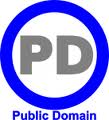This article is about public ownership of creative works.
 Works are in the public domain if the intellectual property rights have expired, if the intellectual property rights are forfeited, or if they are not covered or protected by intellectual property laws. Examples include the English language, the formulae of Newtonian physics, the works of Shakespeare and Beethoven, and the patents on powered flight. The term is not normally applied to situations when the creator of a work retains residual rights in the work, in which case the use of the work is referred to as "under license" or with permission.
Works are in the public domain if the intellectual property rights have expired, if the intellectual property rights are forfeited, or if they are not covered or protected by intellectual property laws. Examples include the English language, the formulae of Newtonian physics, the works of Shakespeare and Beethoven, and the patents on powered flight. The term is not normally applied to situations when the creator of a work retains residual rights in the work, in which case the use of the work is referred to as "under license" or with permission.
 Works are in the public domain if the intellectual property rights have expired, if the intellectual property rights are forfeited, or if they are not covered or protected by intellectual property laws. Examples include the English language, the formulae of Newtonian physics, the works of Shakespeare and Beethoven, and the patents on powered flight. The term is not normally applied to situations when the creator of a work retains residual rights in the work, in which case the use of the work is referred to as "under license" or with permission.
Works are in the public domain if the intellectual property rights have expired, if the intellectual property rights are forfeited, or if they are not covered or protected by intellectual property laws. Examples include the English language, the formulae of Newtonian physics, the works of Shakespeare and Beethoven, and the patents on powered flight. The term is not normally applied to situations when the creator of a work retains residual rights in the work, in which case the use of the work is referred to as "under license" or with permission.In a general context, public domain may refer to ideas, information, and works that are "publicly available", but in the context of intellectual property law (which includes copyright, patents, and trademarks), public domain refers to works, ideas, and information which are intangible to private ownership and/or which are available for use by members of the public.
As intellectual property rights are country-based, and laws vary to some extent, a work may be subject to such rights in one country but be in the public domain in another. Some rights, such as patents and trademarks, depend on registrations in each country in which rights are to be asserted, and in the absence of registration in any country, the work is not protected in that country.

No comments:
Post a Comment